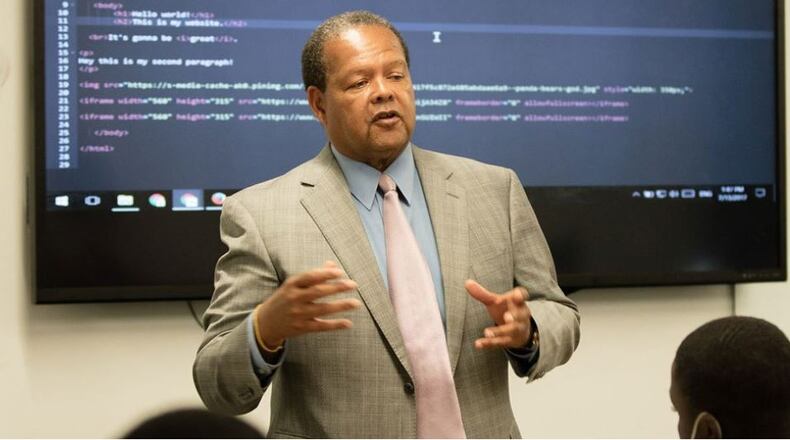The DeKalb County Board of Education picked for its new superintendent an educator with more than 40 years of experience including several high-profile jobs — more than one of which ended with tumultuous departures.
Rudolph F. “Rudy” Crew, 69, has been president of New York’s Medgar Evers College since 2013. He also led the New York City Department of Education — the largest school system in the country — from 1995 to 1999.
In selecting the district's sixth superintendent in the last 10 years, board chairman Marshall Orson said the board was impressed by Crew's track record of innovative thinking, saying it brought significant growth among student outcomes that district leaders here have put high on their wish list in recent searches.
Crew’s past controversies “do not distract from the positive leadership we think he’s going to provide for DeKalb County,” Orson said Thursday morning. “Some of the reforms he’s introduced were called cutting-edge, or seen as innovative. We’re confident he will lead us with the kind of thoughtfulness and attention to detail we need.”
Technically, the job is not his yet, as Georgia law dictates school districts announce finalists 14 days before making an offer. Many districts have announced single finalists in recent years, citing use of a confidential process to shield candidates who want to apply without their interest affecting their current jobs.
Crew is expected to start on July 1, Orson said.
Crew would replace Ramona Tyson, who has said she will retire this summer. In November, Tyson replaced Steve Green, who had run the district since July 2015 before he and the board agreed to part ways. Last May, Green announced plans to leave the district at the end of the current school year.
Past news reports show Crew clashed with leadership, faced questions over spending decisions and was accused of bullying a subordinate in his current job and allegedly obstructed a sexual assault investigation in Florida involving a 14-year-old student and a high school football player later charged with lewd and lascivious assault on a minor.
Crew was not present for the announcement. Orson said he would likely speak publicly for the first time in the coming days.
As chancellor of New York City’s schools, The New York Times wrote that Crew shifted power from local school boards to a centralized board, and was known for firing leaders under him for poor student progress.
But he, too, came under fire for falling standardized test scores, which have become the top gauge of student progress. Crew also clashed with then-Mayor Rudy Giuliani over providing vouchers for poor students to attend private and parochial schools. Crew's contract was terminated in late 1999 in a tight 4-3 vote.
At least one superintendent fired by Crew was rehired after a testing firm admitted to mistakes in tabulating test scores, which caused students to take remediation courses when they actually were not needed.
Irving Hamer, a representative on the board at the time of Crew's ouster, told the Los Angeles Times then that "I dare say it's going to be a long day in a very cold hell until we find someone as good."
According to the Miami Herald, Crew pushed for a new curriculum and saw steady increases in standardized test scores while leading Miami-Dade Public Schools between 2004 and 2008.
The number of students who took advanced placement exams also increased in that time frame, and Crew was praised for starting a Parent Academy that provided workshops, classes and other networking opportunities while pushing parents to be a more integral part of the education process.
But Crew left after clashing with the school board there, as questions surfaced about the district’s budget. When he departed, the district had just $4 million in reserves backstopping a budget of several billion dollars.
In 2012, Crew was tapped to be Oregon's first chief education officer, overseeing about 200 public schools across the state, including students from Pre-K through college. A year later, as he left for Medgar Evers College, The Oregonian reported Crew took six weeks paid vacation and billed the state for thousands in personal travel expenses, including a trip to New Mexico to honor a former colleague and a trip to Los Angeles to teach a course at the University of Southern California, a former employer.
Last year, The New York Post initially wrote that Crew would leave his post as president at Medgar Evers amid concerns over a discrimination lawsuit filed against him by the school's former chief diversity officer. The suit alleged Crew bullied and fired the woman for her handling of a personnel matter.
Crew inherits a district still trying to find its way academically after several years that saw a new curriculum and fluctuating standardized test scores under Green, who led the district from July 2015 until November. Critics have pushed back against the district's plans to address overcrowding, and have called for a forensic audit for better knowledge on how money has been spent.
The district recently saw Moody’s Investors Service remove its credit rating for failure to document finances in recent years, turning in information for its 2018 financial audit nearly a year late after current Superintendent Ramona Tyson prioritized the audit when she took over.
The district also will have to prepare for the financial and academic fallout of the coronavirus pandemic, which has seen students locked out of school buildings and learning from home since mid-March.
Board members spent much of Thursday’s special meeting announcing their decision heaping praise on their selection. Not every board member praised Crew during the meeting. Board member Stan Jester said he had concerns that the district could lose progress made under Tyson in the last six months, and questioned Crew’s history. Board member Michael Erwin did not speak on Crew during the meeting.
“I understand history can be our teacher if we allow it, but I hope we can look forward to the future,” Board vice chairwoman Vickie B. Turner said. “You can’t live in this life and not have experienced some challenges and some negative things. It’s a part of life. But I believe it’s a new day upon us and I believe it is incumbent upon us to come together not just as a district but as a community and take us to the next level.”
Orson, in announcing Crew, said the board took into account data collected from the approximately 1,900 people who shared input with the district throughout the search process.
“Our overriding goal was to make this an open and transparent process,” he said.
While the district sought public feedback, it engaged in a confidential process — allowed by Georgia Law — and only publicly disclosed the number of candidates that applied as the search progressed.
About the Author
Keep Reading
The Latest
Featured



